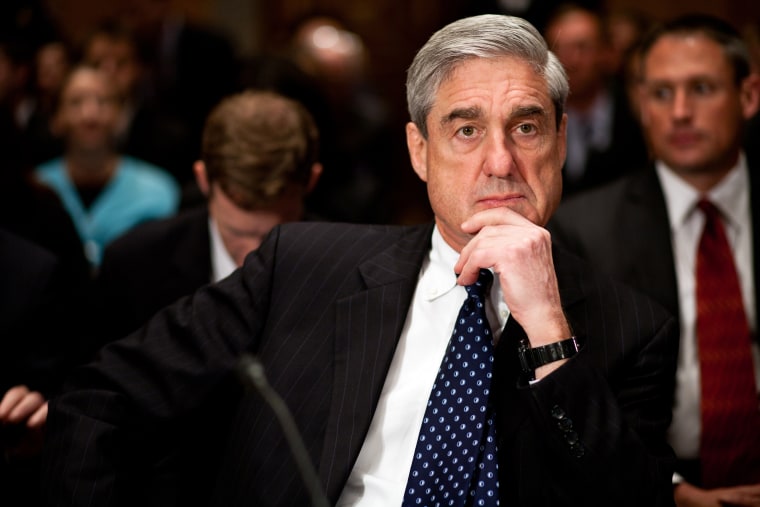WASHINGTON — Special counsel Robert Mueller told Attorney General William Barr that the initial account of the Mueller report in Barr's four-page letter caused public confusion.
Justice Department officials said that in a letter and a subsequent phone call, Mueller said Barr's March 24 letter, a four-page description of what Barr called the report's principal conclusions, did not fully capture the context and substance of the more than 440-page document.
Mueller suggested that Barr release the brief summary sections of the report.
Download the NBC News app for breaking news and politics.
Justice Department officials described the conversation between the men. The contents of Mueller's letter to Barr were first reported by The Washington Post.
The officials said that Mueller did not describe Barr's letter as inaccurate but that he thought it was resulting in misleading news coverage about the report.
"He expressed frustration over the lack of context and the resulting media coverage regarding the special counsel's obstruction analysis," a Justice Department spokeswoman said.
Barr has said he did not want to put the report out piecemeal and could not simply release the summaries because they had not yet been scrubbed to remove grand jury information. Each page of the document, including the summaries, was marked "May Contain Material Protected Under Fed. R. Crim. Prod. 6(e)," a reference to a rule of federal criminal procedure that bars public disclosure of grand jury information.
Senior department officials were described as frustrated that the report did not include proposed redactions to protect that material and other categories of information.
Barr's letter to Congress, which was made public at the time, said the Mueller investigation "did not establish that members of the Trump Campaign conspired or coordinated with the Russian government in its election interference activities." It also said the special counsel's investigation "did not draw a conclusion — one way or the other —as to whether the examined conduct constituted obstruction."
Mueller sent his letter to Barr three days later, saying the resulting confusion threatened to undermine public confidence in the investigation. Justice Department officials said they were surprised by the tone of the letter, but they said Mueller was less pointed in their subsequent phone call.
They said Barr also repeated that his letter was not intended to be a summary of the report. The department spokeswoman described the phone call as "cordial and professional."
Trump's personal attorney, Rudy Giuliani, told NBC News on Tuesday night that he had not been aware of Mueller's letter and that he did not understand what Mueller was taking exception to.
"If he didn't want confusion, he should have made a decision," Giuliani said. "He was made special counsel to make decisions, and the fact he didn't says to me (that Trump) was innocent."
Rep. Eric Swalwell, D-Calif., a member of the Intelligence and Judiciary committees, said Tuesday night that Barr could face impeachment proceedings. Barr is scheduled to testify before the House Judiciary Committee on Thursday.
"I actually think he should face impeachment if he's going to just say, 'I'm not going to follow the law, I'm not going to follow Congress,'" Swalwell said on MSNBC's "Hardball."
"What do you do when you have an enabler like this who just enabled the president's worst instincts?" he asked, adding: "They have to be held accountable, and you have to speak their language, as well. That's the only thing they understand."
The committee's chairman, Jerry Nadler, D-N.Y., said in a statement that he had demanded a copy of Mueller's letter by 10 a.m. Wednesday.
Barr is scheduled to testify about the investigation on Wednesday morning before the Senate Judiciary Committee.
Sen. Patrick Leahy, D-Vt., a longtime member and former chairman of the committee, said in an interview with the New York newspaper Newsday that Barr was acting like Trump's personal lawyer, not the nation's lawyer. He promised to "ask him questions and give him a chance to show some independence."
"We'll see if he does," Leahy said.
Members of Mueller's team have previously expressed frustration that Barr cleared Trump of obstruction of justice in his summary letter in March. A U.S. official who spoke with the members of Mueller's team told NBC News early this month that they believed the evidence that Trump sought to impede the investigation was stronger than Barr suggested.
A senior law enforcement official who also has spoken to members of Mueller's team told NBC News this month that they say the report includes detailed accounts of contacts between Trump's campaign and Russia.
Barr told reporters two weeks ago that there were 10 potential "episodes" of obstruction of justice by Trump but that they didn't amount to illegal activity. But he acknowledged that he disagreed with some of Mueller's legal theories on whether those episodes amounted to obstruction "as a matter of law."
Barr — who expressed skepticism about Mueller's investigation before Trump made him attorney general — testified before a Senate committee this month that the investigation may have involved inappropriate surveillance of the Trump campaign. He said he would conduct a review of the matter.
Trump and congressional Republicans argue that the Russia investigation was the work of biased FBI leaders who bore ill will toward Trump, including former Director James Comey and former Acting Director Andrew McCabe, who was deputy director at the time. Both men have denied that they acted out of any bias.




